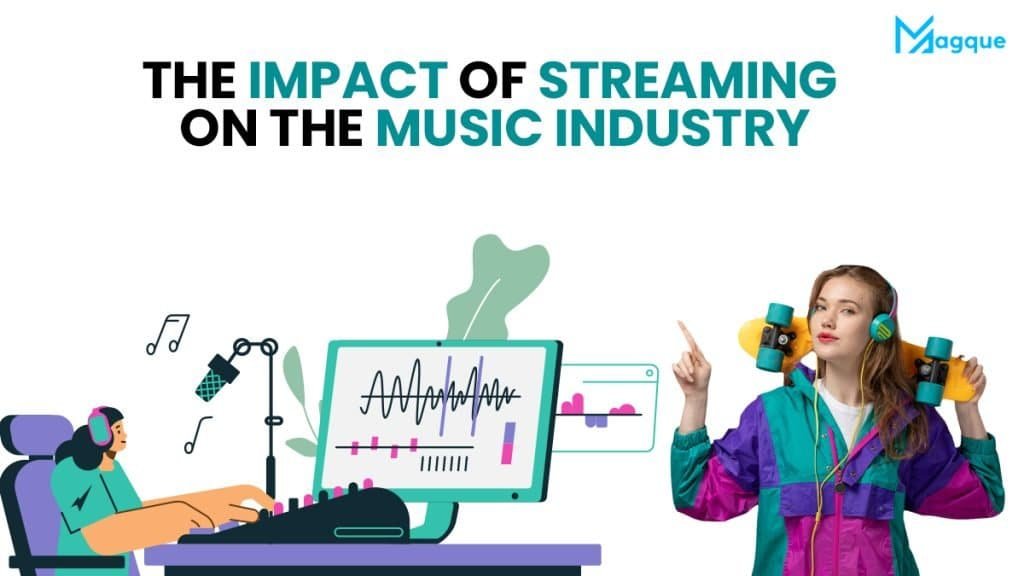Streaming has transformed the music industry in once unimaginable ways. Remember when we had to rush to the store to buy CDs or vinyl records to listen to our favourite songs? Well, those days are long gone, thanks to the advent of music streaming services. In this blog post, we’ll dive deep into how streaming has shaped the music industry, affecting not only how we listen to music but also the lives of musicians, the revenue they generate, and the ever-evol
ing listening trends.
The Evolution of Music Consumption
Gone are the days when we had to lug around stacks of CDs or clutter our homes with vinyl records. With Music streaming services like Spotify, Apple Music, and Amazon Music, we have the world’s music library at our fingertips. It’s like having a massive record store in your pocket, accessible anytime, anywhere. This convenience has revolutionized the way we consume music, making it more accessible than ever before.
The Artist’s Dilemma
While streaming has made music more accessible, it has created new challenges for artists. In the past, musicians relied heavily on album sales and royalties from radio play. With the shift to streaming, artists now earn revenue based on the number of streams their songs receive. This can be a double-edged sword, requiring millions of streams to generate substantial income. As a result, many emerging artists need help to make a living solely from their music.
The Revenue Conundrum
Streaming has undoubtedly boosted the overall revenue of the music industry. However, the distribution of that revenue has sparked debates and controversies. Major streaming platforms pay artists a fraction of a cent per stream, leading to concerns about fair compensation. This has led to discussions about ensuring artists receive a more significant share of the streaming pie. As the industry evolves, finding a sustainable revenue model that benefits artists and streaming platforms remains a pressing issue.
Changing Listening Trends
The rise of streaming services has also influenced our listening habits. With personalized playlists and recommendations, we now have music tailored to our tastes at our fingertips. This has led to a resurgence of interest in older songs and a renewed appreciation for deep cuts from artists’ discographies. Additionally, streaming platforms have become powerful influencers, often driving trends and creating overnight sensations.
The Streaming Effect on Record Labels
The impact of streaming extends beyond artists and listeners. Record labels have had to adapt to the new landscape as well. They are increasingly focused on signing artists with strong streaming potential, shifting away from traditional record sales. This shift in strategy has reshaped the music industry’s power dynamics, with streaming platforms playing a more central role in artist promotion and discovery.
The Future of Music Streaming
As technology advances, the future of music streaming remains uncertain yet promising. We can expect further innovations, such as high-fidelity audio and immersive experiences. Additionally, the debate surrounding fair artist compensation will likely persist, potentially leading to changes in how streaming platforms pay royalties.
In conclusion, streaming has undeniably profoundly impacted the music industry. While it has brought unprecedented accessibility and convenience to music lovers, it has also raised important questions about artist compensation and industry revenue distribution. As we progress, we must strike a balance that ensures artists and streaming platforms can thrive in this ever-evolving landscape. And be sure to explore Magque, your go-to source for the latest and most intriguing updates in the realms of informative tips & reviews!
FAQs
Q1. How has streaming changed the way we listen to music?
Streaming has revolutionized music consumption by providing instant access to a vast catalogue of songs. Listeners can now create personalized playlists, explore new genres, and enjoy music on the go, fundamentally changing how we experience and enjoy music.
Q2. Do artists benefit from streaming, or is it detrimental to their income?
While streaming offers exposure and the potential for wide-reaching audiences, it has also sparked debates about fair compensation for artists. Many artists need help to earn a sustainable income solely from streaming royalties, leading to concerns about the financial well-being of musicians.
Q3. What impact has streaming had on traditional record sales?
Streaming has shifted the focus away from traditional record sales, such as CDs and vinyl. As a result, physical sales have declined in favour of digital streaming. This change has forced record labels and artists to adapt to the new landscape.
Q4. Are there any emerging trends in the music industry driven by streaming?
Yes, streaming has given rise to several trends, including the resurgence of older songs, increased discoverability of independent artists, and the dominance of personalized playlists. Streaming platforms also play a significant role in shaping music trends and promoting new artists.
Q5. How are record labels adapting to the era of streaming?
Record labels are evolving their strategies to align with the streaming era. They are signing artists with strong streaming potential, investing in digital marketing, and forming partnerships with streaming platforms to maximize exposure and revenue.
Read Also This:- The Best Streaming Services for Movies and TV Shows
